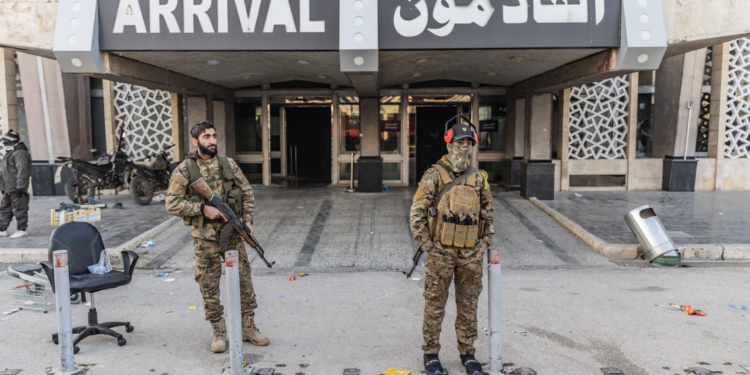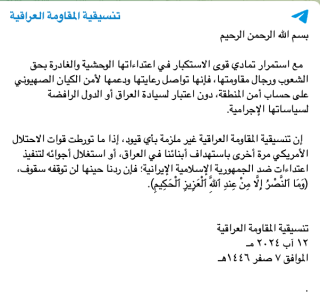The self-styled Iraqi “resistance” has hinted at a desire to end the tit-for-tat sequence of strikes with the United States and return to cost-free counter-Israel operations.
On August 12, the Iraqi Resistance Coordination Committee (al-Haya al-Tansiqiya lil-Muqawama al-Iraqiya, or Tansiqiya for short) issued a short statement that read: “The Iraqi Resistance Coordination is not bound by any restrictions if the American occupation forces get involved again in targeting our sons in Iraq or exploit its airspace to carry out attacks against the Islamic Republic of Iran. In that event our response will not be stopped by restrictions” (Figure 1).This message followed another round of U.S. strikes the day before against militias belonging to the self-styled muqawama (resistance) (Figure 2). Despite the post’s threatening tone, the Tansiqiya seems to be trying to draw a line under the tit-for-tat exchanges with the U.S. military that have unfolded since July 25.
De-escalation the Goal?
The militias seem to be signaling that if U.S. forces keep attacking their assets, they will no longer adhere to their agreement with the Iraqi government, which was reached in February after their attack on the Tower 22 base in Jordan killed three U.S. personnel and spurred U.S. counterstrikes. By taking this tone, they may simply be trying to end the current (probably unintended) cycle of violence with the United States, refocus their attacks on Israel, and prepare for a potentially imminent escalation between the so-called “axis of resistance” and Israel. Notably, the Islamic Resistance in Iraq (IRI)—which had taken responsibility for numerous drone and cruise missile attacks against Israeli targets in past months—stopped making such claims after the present cycle of confrontation with the United States began in Iraq and Syria on July 24.
Both that pause and the new Tansiqiya warning might also be tied to possible Iranian-led retaliation against Israel for recent attacks on senior Hezbollah and Hamas figures in Beirut and Tehran. Iran blames Israel for the assassination of Ismail Haniyeh right under its nose and may soon respond with military attacks. The Tansiqiya seems to be warning the United States not to use Iraqi airspace to strike Iran if said retaliation unfolds.
Looking Ahead
This apparent muqawama effort to deter U.S. action in Iraq (and, to a lesser extent, Syria) sits uncomfortably alongside a reported August 14 rocket attack on the U.S. Conoco base in Syria. (See Militia Spotlight’s attack tracker for a database covering this and other attacks in Iraq and Syria.) Yet that incident remains unclaimed and might have been aimed at Syrian Democratic Forces (SDF) targets colocated with U.S. troops.
In Militia Spotlight’s view, the Iraqi muqawama:
- became unintentionally embroiled in a cycle of attacks with the United States in July 24-31 that may have seen U.S. forces respond to an anti-Israel drone strike in the making (see below); and
- also had to consider the broader axis of resistance “drawing breath” period ahead of a possible retaliation against Israel after July 31.
With an August 18 IRI-claimed strike against Israel—specifically, a drone strike in the Golan Heights, the first anti-Israel attack since July 24—the muqawama may be flexing back into their previous pattern of claiming largely cosmetic “resistance” strikes against Israel, with little evidence of actual effects reaching Israeli soil.
For most Iraqi militia factions, all they really care about is preventing U.S. retaliation inside Iraq, particularly against senior militia figures. Many muqawama figures have transformed into increasingly money-focused oligarchs who enjoy living openly opulent lifestyles in Baghdad. As such, they do not want a status quo in which they are constantly fearful of dying by an American drone strike. The August 14 Conoco attack, if undertaken by Iran-backed fighters from Kataib Hezbollah or Harakat Hezbollah al-Nujaba, could indicate there is a deviant view on this issue, potentially causing greater discordance within the muqawama scene.










































